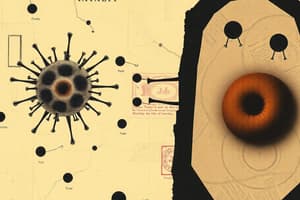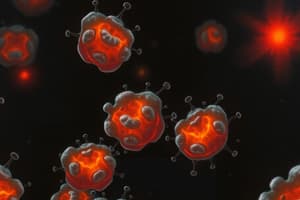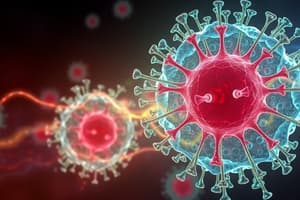Podcast
Questions and Answers
What distinguishes adaptive immunity from innate immunity?
What distinguishes adaptive immunity from innate immunity?
Adaptive immunity is distinguished by its specificity and memory.
Where do B cells and T cells complete their development?
Where do B cells and T cells complete their development?
B cells complete their development in the red bone marrow, while T cells mature in the thymus.
What is immunocompetence in the context of adaptive immunity?
What is immunocompetence in the context of adaptive immunity?
Immunocompetence is the ability of B and T cells to carry out an adaptive immune response.
How do cytotoxic T cells play a role in cell-mediated immunity?
How do cytotoxic T cells play a role in cell-mediated immunity?
What role do helper T cells play in adaptive immunity?
What role do helper T cells play in adaptive immunity?
What is the process of clonal selection?
What is the process of clonal selection?
What are effector cells and memory cells?
What are effector cells and memory cells?
Explain the two characteristics of antigens.
Explain the two characteristics of antigens.
What is an epitope?
What is an epitope?
Where are Major Histocompatibility Complex (MHC) antigens located?
Where are Major Histocompatibility Complex (MHC) antigens located?
What occurs in the lymph nodes when an individual is sick?
What occurs in the lymph nodes when an individual is sick?
How does the human immune system achieve diversity in antigen receptors?
How does the human immune system achieve diversity in antigen receptors?
What happens to effector cells after an immune response?
What happens to effector cells after an immune response?
What is the main difference between how B cells and T cells recognize antigens?
What is the main difference between how B cells and T cells recognize antigens?
What are the roles of antigen presenting cells (APCs) in the immune response?
What are the roles of antigen presenting cells (APCs) in the immune response?
How do exogenous antigens differ from endogenous antigens in terms of presentation?
How do exogenous antigens differ from endogenous antigens in terms of presentation?
What is the significance of costimulation in T cell activation?
What is the significance of costimulation in T cell activation?
Describe the process by which cytotoxic T cells eliminate infected cells.
Describe the process by which cytotoxic T cells eliminate infected cells.
What triggers the activation of helper T cells?
What triggers the activation of helper T cells?
What is the role of IL-2 in the immune response?
What is the role of IL-2 in the immune response?
How do memory T cells contribute to the immune response upon re-exposure to an antigen?
How do memory T cells contribute to the immune response upon re-exposure to an antigen?
Explain how dendritic cells function as APCs in initiating an immune response.
Explain how dendritic cells function as APCs in initiating an immune response.
What distinguishes the action of cytotoxic T cells from natural killer (NK) cells?
What distinguishes the action of cytotoxic T cells from natural killer (NK) cells?
Describe the significance of MHC molecules in antigen presentation.
Describe the significance of MHC molecules in antigen presentation.
What is the role of 'anergy' in the immune system?
What is the role of 'anergy' in the immune system?
How do APCs contribute to the migration of T cells to lymphatic tissues?
How do APCs contribute to the migration of T cells to lymphatic tissues?
Flashcards
Adaptive Immunity
Adaptive Immunity
The body's ability to recognize and target specific invading agents like bacteria, viruses, or parasites, creating long-lasting immunity against them.
Antigens (Ags)
Antigens (Ags)
Substances recognized as foreign by the immune system, triggering an immune response. They can be proteins, carbohydrates, lipids, or nucleic acids.
Cell-mediated Immunity
Cell-mediated Immunity
A type of immune response that involves T cells directly attacking infected cells or foreign invaders, particularly effective against intracellular pathogens.
Antibody-mediated Immunity
Antibody-mediated Immunity
Signup and view all the flashcards
Immune Memory
Immune Memory
Signup and view all the flashcards
Clonal Selection
Clonal Selection
Signup and view all the flashcards
Clone (in immune response)
Clone (in immune response)
Signup and view all the flashcards
Effector Cells
Effector Cells
Signup and view all the flashcards
Memory Cells
Memory Cells
Signup and view all the flashcards
Immunogenicity of Antigens
Immunogenicity of Antigens
Signup and view all the flashcards
Reactivity of Antigens
Reactivity of Antigens
Signup and view all the flashcards
Epitope (Antigenic Determinant)
Epitope (Antigenic Determinant)
Signup and view all the flashcards
MHC Antigens (Major Histocompatibility Complex)
MHC Antigens (Major Histocompatibility Complex)
Signup and view all the flashcards
What are antigen presenting cells (APCs)?
What are antigen presenting cells (APCs)?
Signup and view all the flashcards
What are exogenous antigens?
What are exogenous antigens?
Signup and view all the flashcards
What are endogenous antigens?
What are endogenous antigens?
Signup and view all the flashcards
What are MHC-II molecules?
What are MHC-II molecules?
Signup and view all the flashcards
What are MHC-I molecules?
What are MHC-I molecules?
Signup and view all the flashcards
What is the first signal for T cell activation?
What is the first signal for T cell activation?
Signup and view all the flashcards
What is the second signal for T cell activation?
What is the second signal for T cell activation?
Signup and view all the flashcards
What are helper T cells (CD4+ T cells) and what do they do?
What are helper T cells (CD4+ T cells) and what do they do?
Signup and view all the flashcards
What are cytotoxic T cells (CD8+ T cells) and what do they do?
What are cytotoxic T cells (CD8+ T cells) and what do they do?
Signup and view all the flashcards
What is clonal selection?
What is clonal selection?
Signup and view all the flashcards
What are granzymes?
What are granzymes?
Signup and view all the flashcards
What is perforin?
What is perforin?
Signup and view all the flashcards
What is immunological surveillance?
What is immunological surveillance?
Signup and view all the flashcards
What is anergy?
What is anergy?
Signup and view all the flashcards
Study Notes
Adaptive Immunity
- Ability of the body to defend itself against specific invading agents
- Antigens (Ags) are substances recognized as foreign, triggering an immune response.
- Distinguished from innate immunity by specificity and memory.
Maturation of T cells and B cells
- Both develop from pluripotent stem cells originating in red bone marrow.
- B cells complete development in red bone marrow.
- T cells develop from pre-T cells, migrating from red bone marrow to the thymus.
- Helper T cells (CD4 T cells) and cytotoxic T cells (CD8 T cells) are components.
- Immunocompetence is the ability to carry out adaptive immune responses due to antigen receptors (proteins inserted into plasma membranes), identifying specific antigens.
Types of Adaptive Immunity
Cell-mediated
- Cytotoxic T cells directly attack invading antigens.
- Particularly effective against intracellular pathogens (viruses, bacteria, fungi), some cancer cells, and foreign tissue transplants.
- Involve cells attacking cells.
Antibody-mediated
- B cells transform into plasma cells, producing antibodies (Abs) or immunoglobulins.
- Works against extracellular pathogens found in fluids outside cells.
- Helper T cells assist in both types.
- Cell-mediated (CM) and antibody-mediated (AM) immunity often function together to eliminate large numbers of specific antigens.
Clonal Selection
- Process where a lymphocyte proliferates and differentiates (becoming highly specialized) in response to a specific antigen.
- A clone is a population of identical cells recognizing the same antigen as the original cell.
- This process occurs in secondary lymphatic organs and tissues, evidenced by swollen lymph nodes and tonsils during illness.
- Lymphocytes undergo clonal selection to produce effector cells (inactivation of antigens) such as active helper T cells, active cytotoxic T cells, and plasma cells (which die after the immune response).
- Memory cells do not participate in the initial response but react to subsequent invasions, differentiating into effector and memory cells with long lifespans.
- These cells rapidly eliminate antigens before any signs or symptoms appear.
Antigens
- Antigens have two key characteristics:
- Immunogenicity: ability to provoke an immune response.
- Reactivity: ability to react specifically with antibodies it provoked.
- Entire microbes can act as antigens, but typically only specific parts (small components called epitopes or antigenic determinants) trigger an immune response.
Diversity of Antigen Receptors
- The human immune system can recognize and bind to at least a billion different epitopes.
- An epitope, also known as an antigenic determinant, is the part of an antigen recognized, specifically by antibodies, B cells, or T cells.
- Major Histocompatibility Complex Antigens (MHC) are proteins (self-antigens) located at the plasma membrane surface of most body cells (MHC or human leukocyte antigens (HLA).
- MHC helps T cells recognize foreign or self molecules.
Pathways of Antigen Processing
- B cells can recognize and bind to antigens in lymph, interstitial fluid, or blood plasma.
- T cells only recognize processed antigen fragments presented by antigen-presenting cells (APCs) in a specific way.
- Antigenic proteins are broken down into peptides and associated with MHC molecules for antigen presentation.
- The antigen-MHC complex is inserted into the plasma membrane.
- Antigen processing pathway depends on whether the antigen is outside or inside body cells.
Antigen-Presenting Cells (APCs)
- Process and present antigens.
- APCs include dendritic cells, macrophages, and B cells.
- Locations where antigens may penetrate, such as skin (Langerhans cells), mucous membranes of respiratory, gastrointestinal, urinary, and reproductive tracts, lymph nodes.
- APCs migrate from tissues to lymph nodes via lymphatic vessels.
Exogenous and Endogenous Antigens
Exogenous
- Antigens present in fluids outside body cells.
- APCs (dendritic cells, macrophages, B cells) engulf, process, attach antigens to MHC-II molecules and present them to T cells.
- This process migrates the APC to lymphatic tissue where it can present processed antigens to T cells, triggering a cell-mediated or antibody-mediated immune response.
Endogenous
- Antigens located inside body cells (e.g., infected cells).
- The infected cell displays endogenous antigens bound to MHC-I molecules to T cells, subsequently activating immune responses.
Cell-Mediated Immunity
- Activation of T cells involves a first signal (T-cell receptors (TCRs) binding to specific foreign antigen fragments presented on antigen-MHC complexes) and a second signal (costimulation through membrane molecules like cytokines and interleukin-2). This allows targeted responses and prevents accidental immune reactions.
- Different T cell types like helper T cells (CD4 T cells) and cytotoxic T cells (CD8 T cells) have distinct roles in combating intruders and eliminating infected cells.
Activation and Clonal Selection of Cytotoxic T cells
- Cytotoxic T cells (CD8 T cells) recognize antigens combined with MHC-I molecules.
- Activation requires antigen presentation with MHC-II and IL-2 production by helper T cells.
- Activated cytotoxic T cells attack and destroy infected body cells.
- Memory cytotoxic T cells do not attack immediately. Instead, they remain in the body to provide a faster response if the same antigen appears again.
Elimination of Invaders
- Cytotoxic T cells seek out and destroy infected target cells with mechanisms similar to natural killer cells (NK cells), but targeting is antigen-specific. Cytotoxic T cells use granzymes to induce apoptosis or perforin and granzymes to directly destroy infected cells.
- Immunological surveillance identifies and destroys abnormal cells like cancerous cells.
Activity of Cytotoxic T Cells
- Activated cytotoxic T cells release granzymes and perforins to destroy infected body cells.
- Granzymes induce apoptosis, while perforins cause cytolysis (cell bursting).
Studying That Suits You
Use AI to generate personalized quizzes and flashcards to suit your learning preferences.




